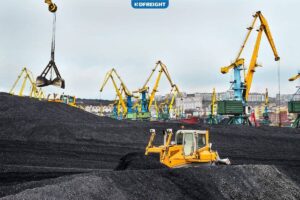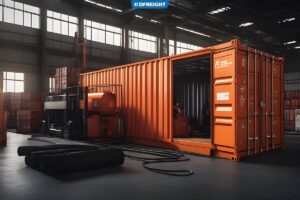A free zone, also known as a free economic zone or free trade zone, is an area within a country where goods may be landed, stored, handled, manufactured, reconfigured, and re-exported without the intervention of the customs authorities. A free zone is usually located near ports or airports and is often established in developing countries to provide foreign investors with special economic incentives. There are many free zones worldwide, and their rules and regulations vary. In this article, we will examine the free zones of the UAE and the Middle East.
Table of Contents
What Is a Free Zone?
A free zone is an area within a country designated as a zone where businesses can operate with little or no taxation and few restrictions. Tax and duties rules in these places may differ from those in other parts of the country, and these laws are different in each country. A free zone may be a geographically-bound area within a country that offers business-friendly conditions. A free zone may be explicitly established for export-oriented manufacturing.
There are several free zones worldwide, varying in size and scope. Some are relatively small, covering just a few acres, while others are much larger and can encompass entire cities.
The Types of Free Zones
There are many different types of free zones, each with its unique benefits. Here are a few of the most popular:
- SEZs (Special Economic Zones): SEZs are designed to attract foreign investment and promote economic development. They typically offer tax breaks and other incentives to businesses.
- FTZs (Free Trade Zones): FTZs are designed to promote international trade. Businesses located in an FTZ can enjoy reduced tariffs and other benefits.
- EPZs (Export Processing Zones): EPZs are designed to promote export-oriented businesses. Businesses located in an EPZ can enjoy tax breaks and other incentives.
- BZs (Business Zones): BZs are intended to promote businesses of all types. Companies in a BZ can enjoy various benefits, including lower taxes and rent prices.
- IZs (Industrial Zones): IZs are designed to promote manufacturing and other industrial businesses. Businesses located in an IZ can enjoy lower taxes and utility rates.
The Benefits of Free Zone
Many properties make free zone attractive to businesses, including:
- Tax Holidays: firms in the free zone are exempt from paying taxes for a period, which gives them a competitive advantage.
- Low-cost Labor: businesses in the free zone can access low-cost labor, which helps keep costs down.
- Access to Markets: businesses in the free zone can access local and international markets, which gives them a competitive advantage.
- Infrastructure: businesses in the free zone can benefit from infrastructure development, including roads, utilities, and communication networks.
- Regulatory Environment: businesses in the free zone are subject to a more favorable regulatory environment, which helps to encourage investment.
- Development: By working in a free zone, businesses can tap into new customer bases and open up new growth opportunities. Additionally, the free zone can provide businesses with a foothold in a new country or region, making it easier to expand operations in the future.
The Disadvantages of Free Zone
There are a few disadvantages of a free zone that are worth mentioning. First, it can be places where companies avoid paying taxes, which can be a problem for governments trying to raise revenue. Second, usage of they for money laundering and other illegal activities. This can be a problem for the country where the free zone is located. Finally, a free zone can be places where working conditions are not as good as they could be. This can be a problem for workers who are looking for good jobs.
There are also some risks associated with the free zone, of which businesses must be aware. These risks include:
- Political instability: they are often located in developing countries, which can be politically unstable. This can lead to businesses being forced to close or relocate.
- Economic downturns: these areas can be adversely affected by economic downturns, as businesses may be forced to close or lay off workers.
- Natural disasters: they can be damaged by natural disasters, such as hurricanes, earthquakes, and floods.
Overall, the disadvantages of a free zone are not enough to outweigh the advantages. These zones can be great places for companies and workers to find good jobs.
Free Zones in The UAE
The United Arab Emirates is home to several free zones which offer ample opportunities for businesses to set up and operate in the country. Free trading zones in the UAE are designated areas free from many trades and investment restrictions placed on companies in other parts of the country. This makes them an ideal location for businesses looking to operate in the UAE. There are many benefits that companies can enjoy by setting up a free zone. These include 100% foreign ownership, 100% exemption from corporate taxes, no personal income taxes, no restrictions on currency repatriation, and several other benefits.
Free trading zones also offer several facilities and services to businesses that are set up there, such as office space, warehouses, business support services, and more. There are more than 40 free zones in the UAE, each with its own rules and regulations. Businesses can choose the free zone that best suits their needs and requirements. Dubai International Financial Centre, the Abu Dhabi Global Market, and the Jebel Ali Free Zone are the most popular free zones in the UAE.
Free Zones in The Middle East
Various free trading zones in the Middle East provide tax and customs incentives for businesses operating within them. The region’s most prominent free zones are in the United Arab Emirates, Qatar, Saudi Arabia, and Kuwait. The UAE is the largest market for free trading zones in the Middle East, with over 40% of the region’s free zones located in the country. The UAE’s free zones are particularly attractive to businesses due to their tax-free status, ease of setting up, and infrastructure.
- Qatar’s free zones are also highly attractive to businesses, offering several benefits such as 100% foreign ownership and 100% repatriation of profits.
- Qatar’s free zones are also well-connected, with excellent transportation links to the rest of the world.
- Saudi Arabia is another important market for free zones in the Middle East, with several free zones in the country. Saudi Arabia’s free zones offer many benefits to businesses, including 100% foreign ownership and 100% repatriation of profits.
- Kuwait is home to several free zones, which offer several benefits to businesses operating within them. Kuwait’s free zones are particularly attractive to companies due to their tax-free status, ease of setting up, and infrastructure.
The Middle East is an important market for free trading zones due to its numerous benefits to businesses. The free zone in the Middle East is desirable to companies due to its tax-free status, ease of setting up, infrastructure, and high market potential.
The Future of Free Zones
However, the future of free trading zones is far from certain. The rise of protectionism, the spread of digital technology, and the evolving nature of global supply chains are just some challenges that free zones must grapple with in the years ahead. Despite the challenges, there is reason to be optimistic about the future of free zones. Free trading Zones have proven adaptable and resilient, likely playing an essential role in the global economy in the coming years.
The main challenge of the free zone is that it is often located in poorly developed areas and lacks infrastructure. This can make it difficult for businesses to get the necessary supplies and services. Additionally, the free zone may not have the same level of security and safety as other areas, which can be a concern for businesses, and must be considered.
Conclusion
A free zone can be an excellent place for businesses to operate. They offer several benefits, including tax breaks, low-cost labor, and market access. However, some risks are also associated with the free zone, which businesses must consider. These risks include political instability, economic downturns, and natural disasters. Companies should research free zone thoroughly before deciding to set up operations and also have a plan in place for how to deal with the risks associated with the free zone.
Are you looking to work in a free zone in the UAE? DFreight can help! We make it easy to find and compare free zones, and our expert team can provide guidance and support throughout the process. So why wait? Contact us and see how DFreight can help you take your business to the next level!
How can I get a business license in a free zone in Dubai?
Businesses can apply for a business license in a free zone in Dubai through the Dubai Chamber of Commerce and Industry.
What are the restrictions on businesses operating in a free zone in Dubai?
The restrictions on businesses operating in a free zone in Dubai include:
Companies must be registered with the relevant authorities.
Businesses must have a physical presence in the free zone.
Companies must comply with all applicable laws and regulations.
What is the difference between a free zone and a special economic zone?
A free zone is an area within a country designated as a free trade zone. A special economic zone (SEZ) is a designated area within a country that offers preferential financial and trade incentives to encourage investment and economic activity.
What are the advantages of using a free zone for shipping goods from Turkey?
Some free zones, such as the Istanbul Free Zone, the Mersin International Free Zone, the Izmir Free Zone, the Bursa Free Zone, the Tekirdag Free Zone, the Corlu Free Zone, and the Gebze Free Zone, can assist you with tax incentives, access to a wide range of services, reduced clearance times, and easy access to international markets during the shipping from Turkey process. Furthermore, free zones provide a secure and efficient logistics infrastructure and are frequently equipped with their own customs office, making the export and import procedure easier.














